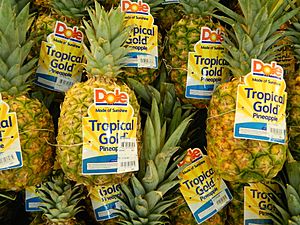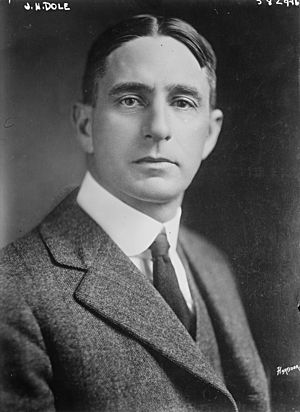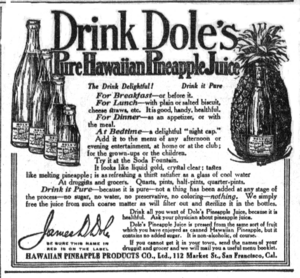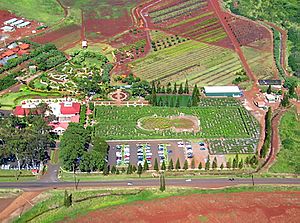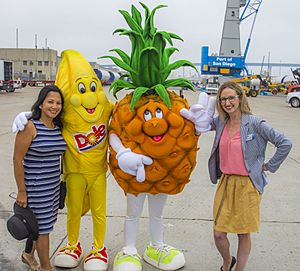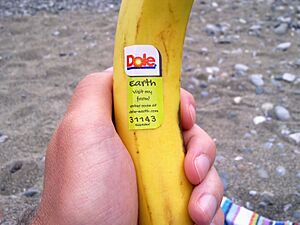Dole plc facts for kids
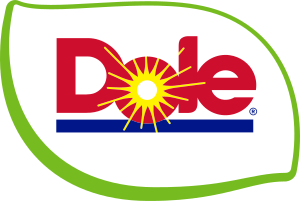 |
|
| Public | |
| Traded as | NYSE: DOLE |
| ISIN | [https://isin.toolforge.org/?language=en&isin=IE0003LFZ4U7 IE0003LFZ4U7] |
| Industry | Agribusiness |
| Founded | June 2, 1851 Kingdom of Hawaii |
| Founder | Samuel Northrup Castle Amos Starr Cooke James Dole |
| Headquarters |
,
Ireland
|
|
Key people
|
Carl McCann (chairman) Rory Byrne (CEO) Johan Lindén (COO) |
| Products | Fruit Vegetables Other food products |
| Revenue | US$6.5 billion (2021) |
| $349.1 million (2021) | |
|
Number of employees
|
38,500 |
Dole plc is a large company that grows and sells fruits and vegetables. It is based in Dublin, Ireland, and also has roots in the United States of America. Dole is one of the biggest companies in the world for fresh produce.
Dole has about 38,500 full-time and seasonal workers. They sell around 300 different products in 75 countries. In 2021, the company made about $6.5 billion in sales.
The company has many processing plants and distribution centers around the world. They also own a lot of farmland. Dole grows and sells bananas, pineapples, grapes, berries, and many kinds of vegetables. They even have their own ships to move their produce around the world.
You might see Dole brand names on other products too. For example, PepsiCo sells bottled fruit drinks using the Dole name. Dole also works with The Walt Disney Company to encourage kids to eat more fruits and vegetables.
History of Dole plc
How Dole Started: Early Years (1851–1900)
Dole plc's story began a long time ago. One part of the company, Castle & Cooke, started in 1851 in Hawaii. It was founded by Amos Starr Cooke and Samuel Northrup Castle. They worked with sugar and shipping. Another part of the company started in Ireland in the 1850s, selling fish, fruit, and vegetables.
Growing Bigger: Expansion and New Products (1900–1969)
In 1899, James Dole moved to Hawaii. He was a cousin of Sanford B. Dole, who was important in Hawaii's history. In 1901, James Dole started the Hawaiian Pineapple Company (HPC). They sent their first canned pineapples in 1903.
At first, the company's pineapples didn't have a special brand name. James Dole and other growers started one of the first big advertising campaigns in the United States to tell people about pineapple.
New machines, like the Ginaca Machine invented in 1911, made it easier to can pineapples. In 1922, Dole bought the Hawaiian island of Lanai. They turned it into the world's largest pineapple farm. By the late 1920s, Dole grew over 75% of all pineapples globally.
During the Great Depression, the Hawaiian Pineapple Company faced money problems. Castle & Cooke took control of it in 1932. The company was renamed "Dole Company" in 1961. Later, Dole started growing fruit in places like the Philippines and Thailand.
Another important company, Standard Fruit and Steamship Company, started in 1906. They shipped tropical fruits like bananas and coconuts from Central America and South America. They grew very fast, building railroads and telephone lines at their farms. Standard Fruit became the biggest banana producer in the world by the 1960s. This company joined with Castle & Cooke in 1968.
Meanwhile, in Ireland, the McCann family's business grew. They combined with other companies to form Fruit Importers of Ireland.
Changes and Growth (1970–2000)
In 1985, a billionaire named David H. Murdock bought Castle & Cooke. Dole then bought other food companies, adding more fruits and nuts to its products. In 1996, Murdock separated Dole from Castle & Cooke. Castle & Cooke then focused on real estate.
Pineapple farming on the island of Lanai slowed down in the 1980s because it became too expensive. Dole stopped its pineapple operations there in 1992.
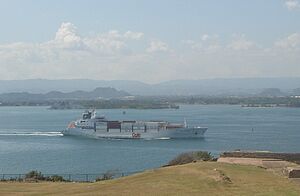
Dole Today: Recovery and Mergers (2000–Present)
In the early 2000s, Dole had financial difficulties. David Murdock helped the company recover and made it a private company again in 2003.
Around this time, some lawsuits were filed against Dole. These lawsuits were about a pesticide called DBCP. In 2007, a judge in California awarded money to some banana workers who sued Dole. However, this decision was later changed. A Swedish filmmaker made a movie about one of these lawsuits called Bananas!*.
In 2006, a company called Total Produce was created from another fruit business in Ireland. Total Produce grew to be one of the largest produce companies in Europe.
In 2009, Dole became a public company again, meaning its shares could be bought and sold on the stock market.
In 2012, Dole sold its packaged food division and some Asian fresh produce operations to a Japanese company called Itochu. Even after this sale, the Dole brand continued to be used for some packaged foods and fresh produce in Asia and Australia. In 2013, David Murdock bought Dole back as a private company.
Total Produce bought a part of Dole Food Company in 2018. Then, in 2021, Total Produce and Dole merged to form Dole plc. Dole plc started trading on the New York Stock Exchange in July 2021.
How Dole Works
Dole operates across five continents. They own a lot of farmland, 13 cargo ships, and many packing houses and distribution centers. Dole grows its own crops on farms in places like Central America. Their ships are special because they have refrigerators to keep the fruit fresh.
Dole's Leadership
As of 2021, Rory Byrne is the CEO (Chief Executive Officer), Carl McCann is the chairman, and Johan Lindén is the chief operating officer.
Where Dole is Based
After merging with Total Produce in 2021, Dole plc has its main world office in Dublin, Ireland. Its main office in the United States is in Charlotte, North Carolina.
Fun Facts About Dole
The Guinness Book of World Records (2007) says that the pineapple maze at the Dole Plantation in Hawaii is the biggest maze in the world.
Bobby Banana is a fun mascot for Dole plc. He is a cartoon banana who appears in Dole comics and games for kids.
Dole Products
Dole sells about 300 different fresh plant foods. This includes whole fruits like pineapples, berries, and citrus fruits. They also sell fresh-cut vegetables, salad greens, and salad kits.
Dole Brands and Friends
Dole works with The Walt Disney Company to put Disney, Pixar, Marvel, and Star Wars characters on their fruits and vegetables. This helps encourage children to eat healthy produce. For example, you might see stickers of characters on bananas. They also create recipes that feature Disney movies.
The Dole brand name is also used by PepsiCo for bottled fruit drinks.
Food Safety at Dole
Dole takes food safety very seriously. Since their fruits and vegetables grow in open fields, they have strict rules to keep food safe. They follow special procedures for their own farms and for farms that grow food for them.
Dole uses a system called SafetyChain. This system uses cellphones to check food quality on the farm. It helps them report any problems right away.
Over the years, Dole has sometimes had to recall products or close factories for cleaning. This happens when there are concerns about foodborne illnesses, especially with bagged salads.
Food Safety in the 2000s
In 2005, health officials found a type of bacteria called E. coli in Dole bagged lettuce. This made 25 people sick. In 2006, another E. coli outbreak linked to spinach packaged under the Dole brand made over 200 people sick. Dole recalled that spinach.
After the 2006 E. coli outbreak, Dole and others in the fresh produce industry worked together. They created new, stricter rules for farming and handling produce to prevent germs.
Food Safety in the 2010s
In 2012, Dole recalled some salads because salmonella bacteria was found. The same year, they recalled bagged salads twice due to Listeria monocytogenes bacteria. They had another recall for L. monocytogenes in 2014. In 2015, Dole recalled bagged spinach because of salmonella.
In 2016, an outbreak of listeriosis (an illness caused by Listeria) was linked to a Dole plant in Ohio. This outbreak led to 33 people being hospitalized and four deaths. The plant closed for four months. Dole later settled some lawsuits related to this outbreak.
Food Safety in the 2020s
In December 2021, Dole recalled many types of packaged salads. This was due to possible Listeria contamination. They closed some packaging factories to clean them. This outbreak led to an investigation by the Centers for Disease Control and Prevention after two people died and 17 became ill.
See also
 In Spanish: Dole Food Company para niños
In Spanish: Dole Food Company para niños
 | Kyle Baker |
 | Joseph Yoakum |
 | Laura Wheeler Waring |
 | Henry Ossawa Tanner |


